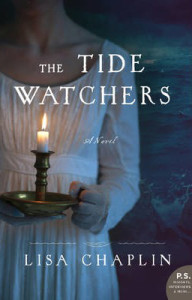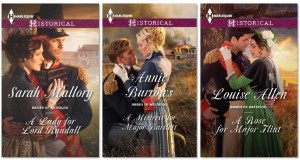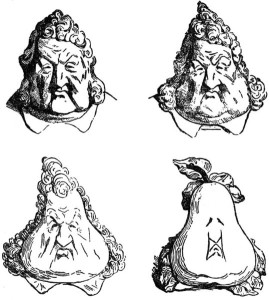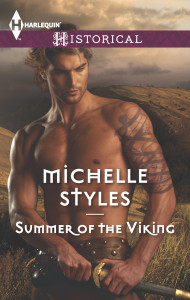 Today our guest is my good friend, Lisa Chaplin. Lisa and I “met” on an Australian/American writers group that came about because of our interest in Romance writing. Some of us have gone on to other ventures, including Lisa, but we’re still in touch by email several times a week.
Today our guest is my good friend, Lisa Chaplin. Lisa and I “met” on an Australian/American writers group that came about because of our interest in Romance writing. Some of us have gone on to other ventures, including Lisa, but we’re still in touch by email several times a week.
Lisa’s first Historical Fiction, The Tide Watchers, will be released June 30, just a few days from now. The Tide Watchers has already earned some rave reviews:
 A Starred Review from Library Journal –
A Starred Review from Library Journal –
In this brilliantly complex novel, Australian author Chaplin…tightens the suspense at every moment while exploring sympathetically the motivations of republicans and aristocrats alike and highlighting the allure and danger of families, secrets, and false identities. Highly recommended for anyone who likes a “ripping good yarn.”
Four and a Half Stars from RT Book Reviews
…incredibly strong and moving tale….A fast-moving pace and a wonderful melding of accurate historical events with honorable, passionate characters make this book impossible to put down.
New Books in Historical Fiction
…a fast-paced story that will keep you riveted in your seat as the pages turn.
You can listen to an interview with Lisa here.
To celebrate Lisa’s Historical Fiction debut, I’m giving away a copy of The Tide Watchers to one lucky commenter here.
Tell us about The Tide Watchers.
Here’s my one-minute blurb: In early Napoleonic France, Lisbeth’s husband abandons her without her papers, without her child. She’s determined to be reunited with her baby and return home. The English baronet’s daughter makes a desperate deal with mysterious British spy, Tidewatcher: she will move in with brilliant American inventor Robert Fulton as his housekeeper, learn how to use his submarine, and charm him into giving it to her. Then she must teach Tidewatcher in turn so they can infiltrate a blockaded French sea-town, find Napoleon’s secret invasion fleet, and somehow disable it just before its launch.
You have written fabulous books for Intimate Moments and Harlequin Romance as Melissa James. How is it you came to write a book of Historical Fiction like The Tide Watchers?
Funnily enough, in a way The Tide Watchers is a natural extension of my old Intimate Moments Nighthawks series. When the line closed, I wasn’t invited to write for the new Romantic Suspense line. I was lucky enough to be asked to write for Harlequin Romance, which I happily did for 6 years. But I never stopped loving espionage novels, and my favorite reading was always historical. I’d read a biography called The Terror Before Trafalgar, which awakened a hunger to write a historical espionage book. Eight years later, The Tide Watchers finally sold, and to my perfect publisher.
The Tide Watchers has already been making a big splash. What’s been the most exciting part of this experience so far?
The whole thing has been an amazing ride for me! William Morrow is a fabulous publisher to write for, and my editor and agent have made it almost like a dream. Getting the power of choice over my cover, my back cover copy, and the like has been wonderful. But the sales rep from Barnes & Noble, a Napoleonic history buff, loved the book – and recent reviews I’ve received from American Library Journal and Romantic Times, it’s all really blown me away. I received the former at the NY office of HarperCollins, and I had to blink back tears of joy. To know others that love history and know history really like my book…I can’t describe it.
What is risky about The Tide Watchers?
The whole book throws the characters far outside their comfort zone. Most of them are seasoned spies, and in a position to save Britain in this time of terror, but ultimately each major character pays a terrible cost. Brilliant, unconventional Lisbeth risks life, reputation and family to save Britain, and to save her child, but she cannot reconcile her sacrifice with what she loses after. Duncan risks the family he always craved to stop Napoleon’s invasion, and loses everything. And his half-brothers risk life and career to save their brother – and the cost to them comes in book two!
Tell us about one piece of research for the book that surprised you or that you did not know before.
The one that surprised me the most, I suppose (there are two), was that brilliant American inventor Robert Fulton was not only in France at the exact time I needed him to be, but was working on early submarine and torpedo technology – and, biggest of all, he seems to have disappeared from the record in the exact months that the book takes place! He turned up again a few months after, which again made it perfect for my second book. The other (sorry, I love both) was the intervention of Lord Camelford at this time, the man called “The Mad Baron”. His attempt to kill Napoleon, and its repercussions for both France and Britain, led to the most bizarre discoveries! But that’s for book two J
You just attended the 200th Anniversary Battle of Waterloo Reenactment. Did you see our fellow Risky, Susanna Fraser there???
Haha…sorry, but I did meet, purely by chance, a Napoleonic military expert walking off the station at Braine l’Alleud! We walked to the battlefield together, and spent the day with him. He pointed out which uniforms were from what battalion, country and where those men fought on the field that day, where they were in earlier battles, etc. He also told me about the role some women played, as victuallers, nurses etc. He gave me his email address and said he’s available for any military question. He’s one of several knowledgeable people I’ve met on this trip that are willing to share their knowledge, so I feel very fortunate.
What’s next for you?
I’m currently on a research trip for the next book in the series (current title Blind Winter). When a past mission gone horribly wrong catches up with Alec Stewart, he puts his brothers and cousin in danger of their lives, as well as his ex-lover and her family. With bounty hunters chasing them all, a fledgling nation fighting for its independence, and Lisbeth’s baby’s father after his son, the vicious power games being played by leaders and spymasters alike change their world forever, including “The Mad Baron”, Lord Camelford. You won’t believe what happens to him! As they say, real life is stranger than fiction…
Thanks, Lisa!
Remember, everyone, comment here for a chance to win a copy of Lisa’s The Tide Watchers. Tell us what you like about Historical Fiction. How is it different than Historical Romance, in your opinion? Or just say hi to Lisa or ask her a question.










